“Confirmed Judges, Confirmed Fears” is a blog series documenting the harmful impact of President Trump’s judges on Americans’ rights and liberties. Cases in the series can be found by issue and by judge at this link.
Trump justices Brett Kavanaugh, Neil Gorsuch, and Amy Coney Barrett cast deciding votes to invalidate part of a Congressional law that provides for the appointment of independent patent judges in cases concerning the reconsideration of patents, continuing the majority’s efforts over the last several years to weaken Congress’ authority. The 5-4 June 2021 decision was in United States v. Arthrex, Inc.
In 2011, Congress passed a law that set up a system under which someone can challenge a patent that was previously issued, which may be important to allow greater competition or for other reasons. Such challenges are filed before the Patent Trial and Appeal Board (PTAB), which usually sits in panels of three and is composed largely of Administrative Patent Judges (APJs) appointed by the Secretary of Commerce. Under the law, the PTAB has the “final word within the Executive Branch” on the validity of a patent; its decisions can be reviewed in the US Court of Appeals for the Federal Circuit. “Billions of dollars can turn” on a PTAB decision.
A PTAB proceeding determined that a patent on a surgical device issued to Arthrex Inc. was invalid. On appeal to the Federal Circuit, Arthrex argued that APJs should be considered “principal officers” under the Constitution and must therefore be appointed by the President and confirmed by the Senate, so that the PTAB decision against it was invalid. The Federal Circuit agreed, and the issue went to the Supreme Court.
Chief Justice Roberts wrote a 5-4 decision, in which Trump justices Kavanaugh, Barrett, and Gorsuch cast deciding votes, that largely agreed with the Federal Circuit ruling and held that the Congressional law was invalid. Roberts wrote that although Congress “provided that APJs would be appointed as inferior officers” by the Secretary of Commerce, as allowed by the Appointments Clause of the Constitution, the law improperly states that each PTAB ruling is a “final decision on behalf of the United States” with no “review by a superior executive officer.” According to the majority, this exceeds Congress’ power under the Appointments Clause and improperly removes from “the President” any authority to “oversee the PTAB” either himself or through another executive official accountable to him. The majority ordered a remedy that essentially severed and ruled unconstitutional the portion of the 2011 law that insulated PTAB rulings from any review by the presidentially-appointed director of the Patent and Trademark Office (PTO) (within Commerce), who otherwise supervises APJs. Under the majority’s ruling, the PTO director can review and change PTAB rulings, and the Court remanded the case so that the director can decide whether to do so here. Justice Gorsuch wanted to go even further and completely set aside the PTAB’s ruling, rule the law unconstitutional overall, and hold that only judges can determine that a patent is invalid.
Justice Stephen Breyer dissented, joined by Justices Elena Kagan and Sonia Sotomayor, and the three also joined part of a dissent by Justice Clarence Thomas. Breyer criticized the majority’s “formalist, judicial-rules-based approach,” and agreed with Justice Thomas that there was “no foundation” for this approach in the Court’s prior decisions. Instead, Breyer explained that the courts should properly treat Congress’ authority to create inferior and principal officers under the Appointments Clause with “judicial deference.” Even a “small degree” of such deference, Breyer continued, would be “sufficient to validate” the 2011 law.
The majority’s decision to the contrary, Breyer went on, would frustrate Congress’ clear purpose to “grant the APJs a degree of independence” in order to respect their expertise and avoid “political interference” by politically appointed executive branch officials. In fact, Breyer wrote, the Court’s ruling completely “prevents Congress” from establishing a system to resolve important and complex patent issues that is “free of political influence.”
Breyer further criticized the decision as part of a “larger shift” by the Court majority towards a “more formal approach” in cases concerning separation of powers that harms Congress’ ability to create independent entities to serve important functions. A prime example, Breyer explained, was the decision also made possible by Trump justices in Seila Law v CFPB, where the majority eliminated the independence of the Consumer Financial Protection Bureau (CFPB) by ruling that Congress could not insulate the CFPB director from being fired at will by the President.
Although this decision does not have the same immediate direct impact on ordinary Americans as cases like the CFPB ruling, it is clearly a part of the current Court’s effort, made possible by Trump justices, to undermine the social safety net and roll back the New Deal by making it difficult or impossible for Congress to insulate agencies and officials that protect Americans’ health, safety, and consumer and economic interests from political pressure and influence. As Justice Breyer noted in this case, the Founders “wrote a Constitution that they believed was flexible enough to respond to new needs,” including those addressed by the “New Deal,” but the majority’s approach clearly harms the Founders’ objective of allowing Congress and the Executive to “implement” key tasks and gives too much authority to “unelected judges.” To help counter the improper actions by Trump justices and judges to roll back the social safety net and repeal the New Deal, it is critical that President Biden nominate and the Senate confirm appellate judges and justices who are fair-minded constitutionalists who will respect the rights of the people and the proper scope of Congress’ authority.

